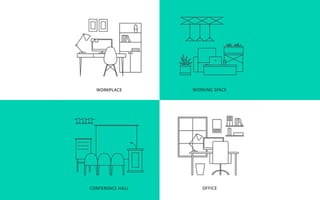Greg Abbott isn’t at work every day, even during a normal week. From Tuesday to Thursday, the corporate development and strategy manager can be found at Riskified’s New York City office right outside Madison Square Park, practicing “latte art” with the company’s in-office espresso machine. The other days, he’s off traveling, making full use of his half-remote work schedule. Abbott has what he considers the best of both worlds; increasingly, more tech workers are agreeing with him.
As companies finessed experimental work policies over the last few years, hybrid work has surfaced as the preferred model for both employers — who want their offices used — and their workers, for whom flexibility is most appealing. More than four out of five employees who have worked in a hybrid setting want to see it remain going forward, according to McKinsey. A hybrid workplace incorporates the inclusive, collaborative and social aspects of the office experience and wraps it in the flexibility of remote work, all packaged with a bow of distinct work-life boundaries.
On a logistics level, a hybrid model also maintains flexibility in hiring. “I’ve seen a huge increase in diversity of thought, background and experience now that our teammates come from all over the country,” said Perri Levine, engineering manager at Bubble. By uncoupling hiring needs from geographical constraints, companies gain access to a wider, more diverse labor pool.
At the same time, eliminating daily commutes and tethers to the office desk also enables employees to decelerate the pace of corporate life and reclaim their own time, resulting in less frequent burnout. By curating cultural and work policies around a flexible hybrid workplace, companies are investing in employee satisfaction and retention. For Abbott, that means less stress running errands or making a doctor’s appointment during the week; Levine has had more time for friends and family.
While companies have since rolled out varying hybrid models, the common thread between them is how the staff have embraced the change. To get a closer look at the advantages of such an arrangement, Built In NYC sat down with two companies to see how their employees are enjoying the freedoms of a part-time office.
Riskified is an ecommerce platform with a focus on service fraud and chargeback prevention.
Nice to meet you, Greg. Please briefly describe your company’s hybrid model.
Our policy is to come into the office twice a week. However, employees are able to choose which days they want to work in the office and from home. There is no cap on the number of days employees can come into the office. If someone wants to come in the whole week, they’re able to make that choice.
The hybrid model gives you the best of both worlds.”
When did your employer implement its hybrid work policy? And what impact has had on the way you and your teammates work?
It has been optional for employees to come in throughout the pandemic, and we started our official hybrid approach in Q1 2022.
As for my team, we usually come into the office Tuesday, Wednesday and Thursday. I like having the ability to brainstorm and collaborate in person or walk across the office to ask a quick question to get issues resolved quickly. We have employees all around the world and a lot of times you will be working with people across countries and timezones, making it difficult to coordinate a Zoom meeting. Because of this, we try to meet up in person as much as possible, especially when people are in the same office.
What are the main advantages you’ve experienced under a hybrid work model?
The hybrid model gives you the best of both worlds. On one hand, you are able to build connections with the people who work across different departments. Between team lunches, happy hours and day-to-day interactions, it is really easy to get to know people when you’re going into the office. My team is very cross-functional so this helps us when we need to work across teams. It helps that Riskified is in a great location right outside Madison Square Park, with a fully stocked kitchen and professional grade espresso machine. I’ve been working on my latte art.
On the other hand, it’s great to be able to work from anywhere for part of the week. This is great for weekend trips as oftentimes I’ll travel on Thursday or come home Monday, which is cheaper and gives you extra time for your trip, too. It’s also great to have the flexibility to run an errand or go to a doctor’s appointment when you need to.
Bubble is a cloud platform for hosting and building web apps.
Pleasure to meet you, Perri. Please briefly describe your company’s hybrid model.
Currently, employees at Bubble are never expected to come into the office. We have a great office space in Manhattan that we will be maintaining for those who wish to work from an office. We love when our out-of-town employees come for a visit, too.
We recognize the opportunity to hire talent from anywhere as an important part of the company’s potential growth.”
When did your employer implement its hybrid work policy? And what impact has this shift had on the way you and your teammates work?
Like many companies, we became remote and hybrid starting in March 2020, and have since remained committed to a hybrid model through the hiring of senior leadership in remote locations, and the introduction of cultural and work policies that are remote inclusive. From virtual company events to tooling for teams working asynchronously,
Bubble is intentionally thoughtful and measured in its approaches and decisions around RTO and remote work. We recognize the opportunity to hire talent from anywhere as an important part of the company’s potential growth that should not be arbitrarily limited.
What are the main advantages you’ve experienced under a hybrid work model?
My entire career in management so far has been on remote or hybrid-based teams, and I think the most obvious advantage is the exposure and ability to work with a much more diverse team, each member with their own unique path to joining the Bubble team.
Some other advantages include the freedom to travel while working and more time with friends and family than I would have in a traditional office set up. It has made it easier to celebrate exciting milestones with friends like weddings, new homes and new babies.









